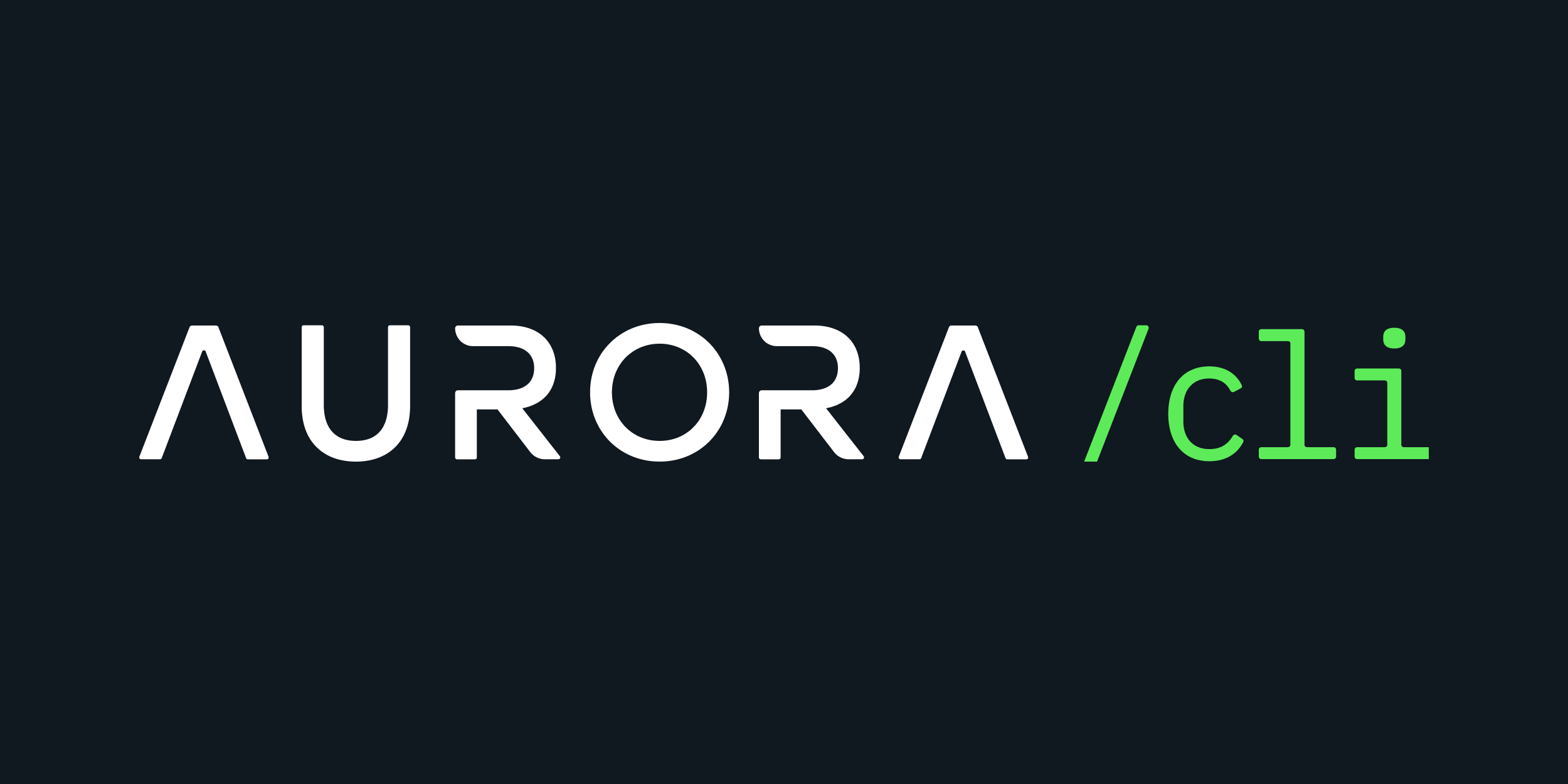An instant, zero-config Aurora engine operator
Aurora is an Ethereum Virtual Machine (EVM) project built on the NEAR Protocol, that provides a solution for developers to deploy their apps on an Ethereum-compatible, high-throughput, scalable and future-safe platform, with low transaction costs for their users. Engine is the Aurora's implementation for it.
Aurora CLI is a command line interface to bootstrap Aurora Engine with rapid speed built with rust.
Aurora CLI comes pre-configuration with opinionated, sensible defaults for standard testing environments. If other projects mention testing on Aurora, they are referring to the settings defined in this repo.
Aurora CLI has the following advantages over api:
- 📝 Easily modifiable EVM states through terminal
- 🤝 Quick to interact for rapid iterations
See also prior version aurora-cli.
- 🦀 Rust
- 📦 Install
aurora-cli-rsand start interacting with it:cargo install --git https://github.com/aurora-is-near/aurora-cli-rs.git - 🔍 Check out what each command is for in the official Aurora docs
- ✋ Have questions? Ask them at the official Aurora forum
In the following example, we will see how to deploy Aurora EVM on the localnet. Also, we will deploy a simple EVM
smart contract and will be interacting with it.
- Rust 1.68.0 or newer
- Python3
First what we need to do is to install aurora-cli:
git clone https://github.com/aurora-engine/aurora-cli-rs
cd aurora-cli-rs && cargo install --path . Next we need to start a NEAR node locally. We can use the NEAR utility, nearup.
Install nearup:
pip3 install --user nearupStart NEAR node:
nearup run localnet --home /tmp/localnetAfter that we need to prepare an account and create a file with a private key for the Aurora EVM.
aurora-cli --near-key-path /tmp/localnet/node0/validator_key.json create-account \
--account aurora.node0 --balance 100 > /tmp/localnet/auora_key.jsonLet's check if the account has been created successfully:
aurora-cli view-account aurora.node0If everything went well, the response should be like this:
{
"amount": "100000000000000000000000000",
"locked": "0",
"code_hash": "11111111111111111111111111111111",
"storage_usage": 182,
"storage_paid_at": 0
}Now we can deploy and initialize the Aurora EVM. To download the latest version, run the following command:
curl -sL https://github.com/aurora-is-near/aurora-engine/releases/download/latest/aurora-mainnet.wasm -o /tmp/aurora-mainnet.wasmDeploy Aurora EVM:
aurora-cli --near-key-path /tmp/localnet/auora_key.json deploy-aurora /tmp/aurora-mainnet.wasmInitialize Aurora EVM:
aurora-cli --engine aurora.node0 --near-key-path /tmp/localnet/auora_key.json init --chain-id 1313161556 --owner-id aurora.node0And now we can deploy the EVM smart contract. In our example, it will be a simple counter that can return its current value and increment and decrement its value.
But before that we need to generate a private key for signing transactions:
aurora-cli key-pair --randomThe response should be similar to this:
{
"address": "0xa003a6e0e1a1dc40aa9e496c1c058b2667c409f5",
"secret_key": "3fac6dca1c6fc056b971a4e9090afbbfbdf3bc443e9cda595facb653cb1c01e1"
}NOTE: The key should be used for demonstration only.
Deploy EVM smart contract:
aurora-cli --engine aurora.node0 --near-key-path /tmp/localnet/auora_key.json deploy \
--code $(cat docs/res/Counter.hex) \
--abi-path docs/res/Counter.abi \
--args '{"init_value":"5"}' \
--aurora-secret-key 3fac6dca1c6fc056b971a4e9090afbbfbdf3bc443e9cda595facb653cb1c01e1If everything went well, the response should be like this:
Contract has been deployed to address: 0x8417907c7158f02b42b0962cac27c4b4fd4a11f2 successfully
So. Now we have deployed the smart contract at address: 0x8417907c7158f02b42b0962cac27c4b4fd4a11f2.
Let's interact with our smart contract. First, let's check that the current value is the same as we set in the
initialization stage. For that, we will use the view-call operation, which doesn't demand a private key
because it is a read-only operation:
aurora-cli --engine aurora.node0 view-call -a 0x8417907c7158f02b42b0962cac27c4b4fd4a11f2 -f value \
--abi-path docs/res/Counter.abiIf we see 5 then everything is right.
Now let's try to increment the value:
aurora-cli --engine aurora.node0 --near-key-path /tmp/localnet/auora_key.json call \
--address 0x8417907c7158f02b42b0962cac27c4b4fd4a11f2 \
-f increment \
--abi-path docs/res/Counter.abi \
--aurora-secret-key 3fac6dca1c6fc056b971a4e9090afbbfbdf3bc443e9cda595facb653cb1c01e1In the response, we can see if the transaction was successful and the amount of gas used for the execution of this transaction.
Let's make sure that our value was incremented:
aurora-cli --engine aurora.node0 view-call -a 0x8417907c7158f02b42b0962cac27c4b4fd4a11f2 -f value \
--abi-path docs/res/Counter.abiSo, if we can see 6 in the output then the demo was successful. That's it!
Also, aurora-cli can be built with the advanced command line interface. Advanced CLI provides more options and
advanced features. You can try it by building with the following command:
cargo install --path . --no-default-features -F advancedDocumentation on how to work with the advanced version of aurora-cli can be found here.

